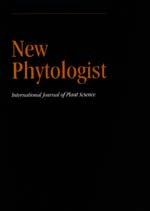Article contents
Synthesis of fructans by partially purified fructosyltransferase activities from Lolium rigidum
Published online by Cambridge University Press: 01 May 1997
Abstract
Sucrose[ratio ]sucrose fructosyltransferase (SST) activity was partially purified from whole shoots of Lolium rigidum by a combination of affinity chromatography, gel filtration and anion-exchange chromatography. The SST activity co-eluted with some fructan[ratio ]fructan fructosyltransferase (FFT) and invertase activities and consequently the partially purified preparation was termed the fructosyltransferase (FT) preparation.
The SST-like activity in the FT preparation was purified 214-fold and had an apparent molecular mass of 84000. The FT preparation contained several peptides with an apparent pI of 4·6–4·7. When assayed with sucrose concentrations up to 600 mM, the FT preparation synthesized 1-kestose at all concentrations, and synthesized 6-kestose at concentrations of 150 mM and greater. The Km of 1-kestose production was 0·2 M. When the FT preparation was assayed at a concentration of activity approximately half that measured in fresh tissue with 100 mM sucrose, 1-kestose, or 6G-kestose as substrates, fructans of degree of polymerization (DP) [les ]5 were synthesized.
A partially purified FFT activity, free of SST and invertase activities, which synthesized β-2,1-glycosidic linked oligofructans of DP [les ]6, was combined in vitro with the FT preparation (FFT-FT preparation) to give a ratio of SST[ratio ]FFT activities similar to that measured in crude enzyme extracts from L. rigidum. The FFT-FT preparation synthesized oligofructans when assayed with 100 mM concentrations of sucrose, 1-kestose or 6G-kestose, but was not able to synthesize fructans of DP [ges ]6 even after extended assays of up to 10 h. The FFT-FT preparation was also assayed with 100 mM sucrose with small amounts of concentrated sucrose added periodically during the assay to maintain the substrate concentration. In this assay, the FFT-FT preparation synthesized fructans up to an apparent DP of 17 or greater. The fructans of DP [ges ]6 synthesized in the assay appeared to form two molecular series containing both β-2,1- and β-2,6-glycosidic linked fructosyl residues with terminal or internal glucosyl residues. The apparent rate of SST activity in the assay of the FFT-FT preparation was greater than that measured in a similar assay of the FT preparation alone which did not result in fructans with DP [ges ]6. It was concluded that the FFT-FT preparation, when assayed with a continual supply of sucrose, contained a factor which promoted synthesis of fructans of DP [ges ]6 and synthesis of β-2,6-glycosidic linkages between fructosyl residues.
Keywords
- Type
- Research Article
- Information
- Copyright
- Trustees of the New Phytologist 1997
- 4
- Cited by


